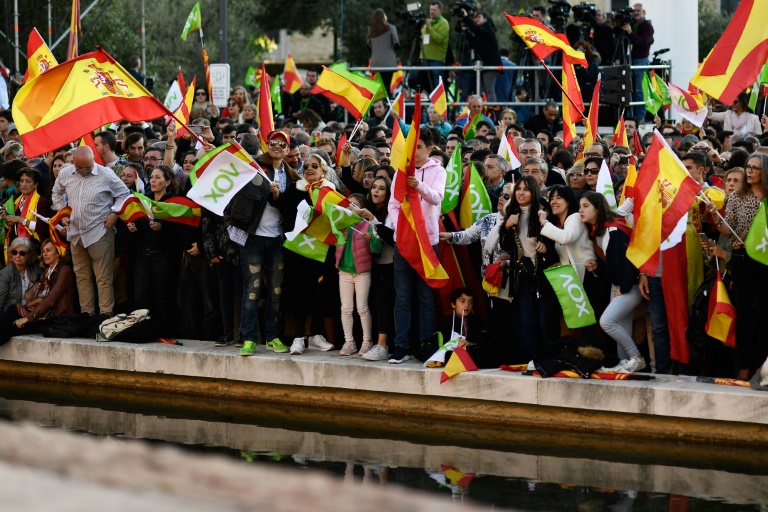For the third time in four years, Spaniards voted once more in a general election on Sunday. Yet, despite what must have been at least an element of voter fatigue, turnout was high at 75.75 percent just surpassing the last high turnout of 75.6 percent in 2004 following the Madrid train bombings. These elections clearly mattered.
Interminable Battle for Power
The main winner was the Socialist Party (PSOE) which went from 85 to 123 seats. While the PSOE could clearly claim victory, forming a government will not be easy, not the least because a next round of elections is just around the corner. In May, local, regional (in some autonomous communities), and European elections will take place.
PSOE leader Pedro Sanchez, whose Socialist Party won the largest share of the vote with 28.8 percent, has been quick to say that negotiations to form a government will not begin in earnest until after this next round of voting. This might affect once again which political formation is gaining the upper hand in what Spanish daily El País has called the “interminable battle for power.”
The easiest option would have been a coalition with the center-right Citizens, but this was clearly ruled out by its leader Albert Rivera before the elections. Despite subsequent pressure from business leaders, it will be hard for Rivera to backtrack on this decision particularly given the proximity of the upcoming elections.
While an alliance with the left-wing Unidas Podemos is a real possibility, the fact that they dropped from 71 to 42 seats means their support alone will be insufficient. Their necessary presence, however, will complicate any support from some of the smaller, more right-wing nationalist parties.
The nationalist parties of the Basque Country and Catalonia continue to be important and might well be influential in supporting or blocking the formation of a governing coalition. In the Basque Country, the Basque Nationalist Party gained votes and an additional seat while the left-wing, nationalist EH Bildu doubled its seats to four. In Catalonia, the Republican Left won for the first time since the Francoist dictatorship, but the Catalan question will complicate any possible support for a Sanchez government.
Losers of Spain’s Election
The main loser was the Partido Popular (PP) which plummeted to only 66 seats compared to 137 in 2016. This was a clear signal that the PP’s move to the right under Pablo Casado had been a mistake: the PP saw itself squeezed between the extreme right-wing Vox, which with 24 seats gained national parliamentary representation for the first time, and the center-right Citizens, which won 57 seats.
Just under 1 percent separated the vote share of the PP (16.68 percent) and Citizens (15.86 percent) who are now seeking to portray themselves as the main opposition party.

The post-electoral alliance between the right-wing forces of the PP, Ciudadanos, and Vox in Andalusia following the latter’s success in the Andalusian regional elections in December had raised the possibility that this could provide a blueprint for governing the national parliament. Yet, voters clearly rejected this possibility on Sunday.
With the next electoral contest looming, Casado has responded swiftly to recuperate the center-right ground. In a rapid, and some would argue cynical, volte-face, he has accused Vox of representing the “extreme right” and has launched the PP’s electoral campaign with the slogan “centered on your future” thereby leaving no doubt as to the PP’s centrist position.
Continuity and Change
The results of Spain’s latest election demonstrate that the country’s once stable “two-party plus” system continues to be in flux.
Ever since the eruption of the 15M movement in 2011 when citizens filled the streets and squares across Spain chanting the slogan “They don’t represent us,” the share of the vote of the two main parties – the PSOE and the PP – has continued to decline. Last Sunday, their combined vote hit a new low of 45.38 percent. This was a long way from the previous lowest share of 63.7 percent in the first democratic elections in 1977 and a far cry from their highest share of 83.81 percent in 2008.
Despite the fragmentation of the party system, there is also continuity. Spanish politics continue to be defined by a stubbornly persistent left-right cleavage. The newer political formations – the center-right Citizens, the left-wing Unidas Podemos, the closest to being the political heir of the 15M movement, and the extreme right-wing Vox – do not represent a shift of voting behavior but rather a redistribution of the same left-wing/right-wing voters amongst different party structures.
Moreover, this left-right political cleavage is crisscrossed and complicated by an equally durable territorial division. It is revealing that the PP lost all political representation in the Basque Country and retained only one seat in Catalonia.
While maps comparing the distribution of votes in 2019 with the 1936 elections are overstating the cyclical nature of politics, it would also be a mistake to ignore the durability of political cleavages in Spanish politics amidst tales of flux and change.
La historia es cíclica…
Elecciones generales 1936
Elecciones generales 2019 pic.twitter.com/uUGIIkY5Lj
— Eduard 🐘 #Seguim🌊 (@Marfil1961) April 29, 2019
Perhaps the only certainty flowing from the results of Sunday is that with no overall winner voters are demanding parties work with each other to solve some of the country’s intractable political problems, not the least the issue of Catalonia.
It was telling that the Catalan question dominated this election, as it did the Andalusian regional elections in December, despite Spaniards continuing to identify unemployment as one of the country’s main problems. Yet economic issues barely featured during the election campaign.
Whatever the outcome of the current trial against the Catalan leaders of the October 2017 independence referendum, the issue of Catalan independence can only be solved through political negotiation. Voters have just given their political leaders a clear signal that it is time to get that process started.
Disclaimer: The views and opinions expressed here are those of the author and do not necessarily reflect the editorial position of The Globe Post.




















